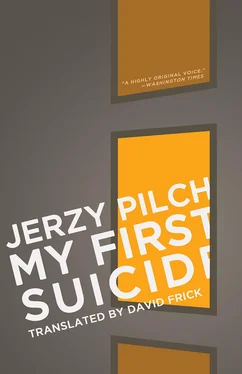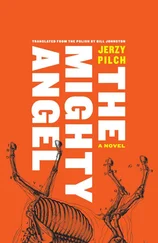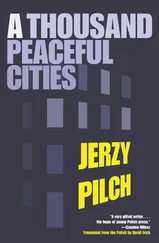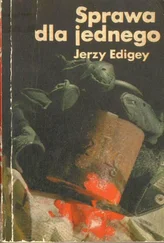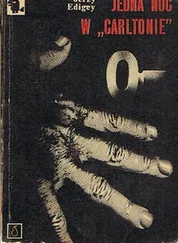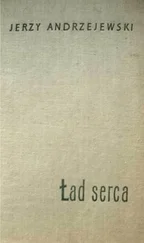VII
Across the bridge, around the sports center, then right and a little bit more toward Partecznik, and there you are. The whole time, a level, straight road, only later, just before the house, does it get steep, but also not for more than twenty yards. On Christmas Eve itself, it snowed the entire afternoon, but the ploughs were out driving like God knows what. It was probably because some Party mandarin in the little castle on Kubalonka was putting on a Christmas Eve fête, and the whole vicinity was on alert. They dressed up as was fitting, they strapped to the sled the net with the presents and the great pot of cabbage that Mother cooks every year for Christmas, and giddy-up! Giddy-up to Jarzębata Mountain! They went, and all the time it seemed to them that this wasn’t Christmas Eve, because, after all, on Christmas Eve you don’t budge from the house. Even in thirty-nine, in order to get home in time for Christmas Eve, Grandpa Pech had made a run for it from a German transport. And he got there on time. But now they are leaving home, and, wrapped in thick blankets up to their ears, like a couple of vagrants, they drag the sled with the bundles behind them.
They don’t know the word unreality; on the contrary, everything they pass on the way — that was their world. The park, the Monument to the Silesian Woman, the bridge, the mill buried up to its roof, the completely frozen Mill Stream, the Stawarczyks’ house and the Mitręgas’ cottage, the prewar villa of Professor Gawlas, the footbridge over the stream, the turn toward Partecznik. The lights at the house of Janek from Wymowa were on, probably he is already sitting down to supper with Hela. Then another bit, as if through a gigantic corridor of snow; finally, the white wall of the forest and the dark silhouettes — ours are already waiting for us.
But no one runs out to meet them, they stand as if frozen, from close up they all also look strange and uncomfortable. What, in the name of God the Father, has happened on this Christmas Eve? Nothing has happened. Nothing big has happened. It was just that the snowplow hadn’t removed the snow right up to the house, because it is too steep, and now it wasn’t clear how Mama would make it up there. Grandpa would somehow manage, but Grandma — with those legs of hers? She can manage on level ground, even uphill, but not in snow like that. Somehow we’ll manage. But how? Maybe we should take the bundles off the sled and come up with some way to slide her up there on the sled? Out of the question. She would sink and be suffocated, on Christmas Eve to boot. So how? No idea. We’ve got to come up with something, because everyone will freeze to death here; they were forecasting minus twenty-five degrees for that night. My Christmas Eve story is silence full of helpless shame. Grandma Pech’s story about Gustaw’s death was a single-sentence. In my Christmas Eve story there is no room for even one sentence.
Suddenly an absolute idea flashes in my head, suddenly I feel like the writer who, finally, after a long silence, has composed a phrase that is not only beautiful, but also thoroughly true, and who knows that after that phrase others would follow, equally beautiful and true. Suddenly, he feels the pride of the group leader, the ship captain, the troop chief, perhaps even the pride of the family father, who, with one gesture and one thought, finds the way out of a stalemate. And so I say, with hasty enthusiasm, that it would be best and safest for Grandma to force a safe passage through the snow on the wicker rocking chair, which is standing by the fireplace. We’ll seat her comfortably and, as if on a throne with runners, as if on a royal sleigh, we’ll haul her right up to the threshold. And I’m already half turned, at a half run, already as if on angel’s wings, I fly to get the rocking chair, which will immediately become a novelistic vehicle, and I hear how Father and Mother suddenly begin spasmodically to shout each other down: Out of the question! The chair will be destroyed! Absolutely out of the question! The new piece of furniture will be destroyed! Out of the question. And I freeze, and everyone freezes, as if the whole frost forecast for that night, and even a frost two hundred degrees colder, had come falling down from the heavens at precisely that moment.
My aunt, the pious bigot, explains that perhaps there wouldn’t be great damage, and perhaps none at all — after all, the snow was fresh, and as clean as a whistle to boot. But what are you talking about! You have to have air for brains to say such reckless things! Who wastes things that were acquired with the sweat of one’s brow? Who? What is more, everything, every little thing was wangled through connections! Where are you going to find a chair like that now? Where? Nowhere! And everyone understands, and Grandma Pech understands, and Grandpa Pech understands, and he says: Peace be to this house! And with a firm motion he takes Grandma by the arm, and off they go.
They move decisively, and they walk quickly. The way now seems shorter, the sky full of stars, the snow crunches under their feet. It is as if Grandpa even sees a bit better, and her leg — miracle of miracles! — hurts less. She has a bit of a guilty conscience that she has made such a muddle, but she feels his hand, he feels her arm, and he knows that this is the arm of the woman of his life. The closer they get to home, the more sprightly their expressions, the more their moods improve. It is good to return home for Christmas Eve.
Right off, Grandma will warm up the rest of the cabbage, which she had left in the pantry for New Year’s. They will sit down to the table, say a prayer, share the Host with each other, and sing: “The time of joy and cheer to this world has arisen! For a Savior, a Redeemer, to sinful man is given!” And then Grandpa, in a surge of euphoric spirits, which he hadn’t felt for years, will grab the round stool and head off toward the clocks. He hadn’t wound them for God knows how long. Already the year before — even after lugging a painter’s ladder into the house and climbing up on it as high as he could — instead of clock faces he saw blurry white spots. Now, on Christmas Eve, he didn’t regain his sight, but, so it seems, he counts on a more spectacular miracle.
He winds one after the other, he turns the key with youthful verve, he moves the hands by intuition, which is to say — blindly. The last clock in the last room hangs directly across from the portrait of Gustaw Branny. Granted, in his all-embracing euphoria, Grandpa does not come to the sudden conclusion that the old photograph fits in here quite nicely, that perhaps it is an even better decoration than the faded tableau from ages ago; the entire burden did not disappear from his heart, but he shrugs it off as a mere trifle: one has other truly important matters to deal with! He winds the last clock and, weary from his high-wire stunts, he returns to the kitchen and waits for the new hour. And the minutes drag on, as in sleepless nights, and finally it is nine, and at first, for a long time, for a very long time, nothing happens, and nothing but an even more dramatic ticking is to be heard. Then — as if someone were taking an endlessly deep breath, as if someone in the depths of the house were pushing on a door handle, as if a dropped ten-złoty coin were rolling endlessly long across the floor — the slowly gathering racket of the springs, finally one clock, with the greatest difficulty, tolls three times, another not at all, the third rasps and wheezes, like a patient attempting in vain to come around from general anesthesia, the fourth begins to toll feverishly and ceaselessly, as if it were announcing fire or war, the fifth is carried away with the volcanic cough of the dying consumptive. Grandma hides her head in her arms, she has a terrible desire to laugh, but she doesn’t want to hurt Grandpa with her laughter; she leans over the table and doesn’t see that he, too, more and more heartily, and more and more proudly, smiles to himself.
Читать дальше
